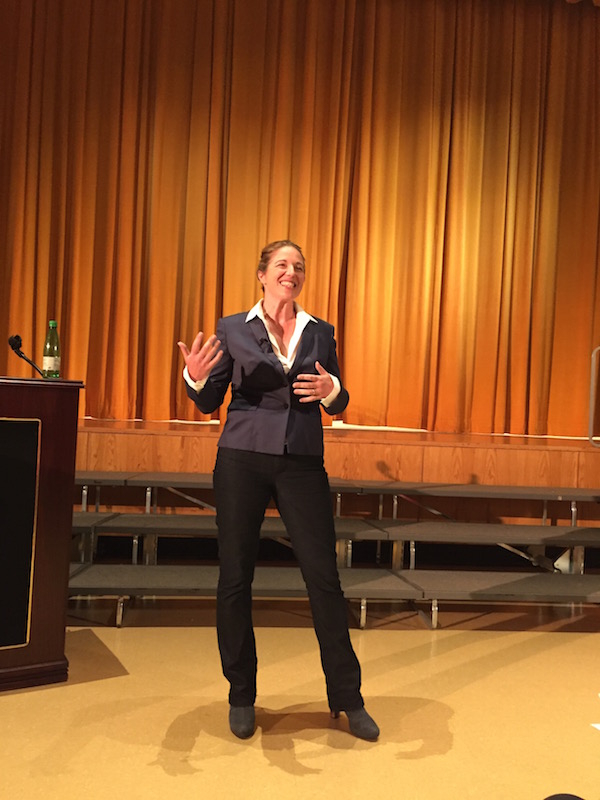Jessica Lahey Urges Parents to Let Their Children Fail So That They Can Succeed
- Friday, 30 October 2015 16:46
- Last Updated: Friday, 30 October 2015 16:46
- Published: Friday, 30 October 2015 16:46
- Stacie M. Waldman
- Hits: 5795

Ms. Lahey's book focuses on the school-age years when parents must learn to allow their children to experience the disappointment and frustration that life brings rather than protecting them from it. She spoke about over-parenting and a fear of failure that many school children take on that affects their curiosity and desire to learn. Ms. Lahey calls this curiousity "intrinsic motivation" and focused her talk on how we as parents can best support and develop it in our children to help them find success both in school and out of school.
"Why are people motivated to do what they do?" she asked. Ms. Lahey suggested that there is extrinsic motivation which places controls on behavior like a reward system, nagging, or punishment. "These are horrible for self motivation," she claimed. "If you want someone to have intrinsic motivation and do something that elicits creativity, then remove extrinsic motivation whether in the form of a reward or punishment. As soon as you put a reward on something, a child loses intrinsic motivation."
Using many anecdotes from her teaching experience and her years of parenting, Ms. Lahey described why intrinsic motivation is necessary for learning and everything else beyond that in life. She asserts that to be intrinsically motivated, you need the following three attributes:
• Autonomy
• Competence
• Connectedness
Autonomy is defined as independence, and ultimately this is what we hope for our children. However, we must promote it as an attribute from an early age. Ms. Lahey describes one type of parenting style as autonomy supportive – a style we should strive to adopt -- and another as directive (or controlling) parents which we should strive to avoid as this backfires and causes anxiety in children.
Competence is confidence based on actual experience. Ms. Lahey used school math problems to describe "desirable difficulties," or challenges that are good for kids (within their ultimate ability). "Children who are most likely to succeed are exposed to problem-based learning," she suggests, and referenced an independent film called "Most Likely to Succeed." She strongly cautioned against labeling kids as smart or not smart, but rather commending them for the effort they put into a project, a paper, a test, or homework as it creates a "fixed mindset" in the child and ultimately backfires. "How a child reacts to something when it gets hard helps define what a child will be like as an adult," Ms. Lahey said.
Connectedness is essentially the "science of self-motivation," or "...the idea that our parents and teachers love us and trust us, even if we don't perform to their standards," Ms. Lahey said. She suggested that parents and teachers "...need to help kids understand that what they do in the classroom is relevant to the outside world." She stressed the importance of helping kids find this connection. Math makes more sense when kids can use it practically.
Ms. Lahey warned against the use of parent-student-teacher portals where you can follow most of what your child is doing at school. "I truly believe this is destroying the parent-teacher, teacher-student, student-parent relationship," she said. "It is so disruptive and unfair to a child to provide this type of surveillance."
She left the audience with a quote to think about as they went home to their own kids:
"What makes us feel good in the moment may not be good for our kids in the long haul." Using the homework that her son left at home as an example, she said she wanted to bring it to him at school but chose not to so that he would learn to be more responsible in the future.
One audience member asked what to do if a kids comes home with an "F" because they didn't study? Ms. Lahey's answer was "Duct tape parenting. Essentially, you want to react the same way to an A as you do to an F. With an F, simply ask what he can do next time to prepare better rather than getting mad and voicing your disappointment. Simply encourage your child to work harder, try harder."
This allows for a child to solidly benefit from intrinsic motivation and removes external controls.
Ms. Lahey's book can be purchased here:














